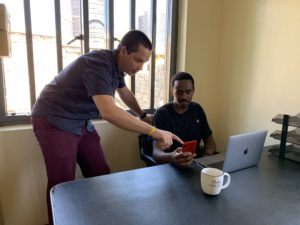
Together with Duke SRT students, undergraduate app developers, and Kenya-based members of the Center for Global Reproductive Health, I will be leading a pilot usability study of an integrated digital platform called mSaada. The goal of this platform, placed in the hands of community health volunteers (CHVs) during HPV-based cervical cancer screening, is to help facilitate the successful completion of the cervical cancer prevention cascade. This will be achieved by mSaada’s many features: patient education, protocol and counseling support for CHVs, results notification, service reminders, and patient tracking. Over the course of the summer, we will train CHVs on proper use of mSaada, allow them to use the app in a clinical setting, and gather periodic feedback through quantitative questionnaires and structured in-depth interviews. We aim to gain a strong understanding of user experience, acceptability, and feasibility of the mSaada platform within the context of Western Kenya.
My interest in this project is multifactorial. First, by studying and working to combat a disease that specifically  affects women, my general interest in women’s health is met. Second, my desire to discover and enhance existing disease prevention strategies is well suited for this project as cervical cancer disproportionately and unnecessarily claims the lives of many women in low- and middle-income countries, such as Kenya. Also, I find the use of new and innovative methods to increase access and uptake of health services, such as mhealth approaches, to be promising. Additionally, the intersection of communicable and non-communicable disease, from HPV infection to cervical cancer development, is of particular interest to me. Finally, given my prior health-related travel experience in Ghana and Mexico, I wanted an opportunity to travel to a new place to broaden my worldview and enhance my understanding of the differences in approach to and delivery of care around the world.
affects women, my general interest in women’s health is met. Second, my desire to discover and enhance existing disease prevention strategies is well suited for this project as cervical cancer disproportionately and unnecessarily claims the lives of many women in low- and middle-income countries, such as Kenya. Also, I find the use of new and innovative methods to increase access and uptake of health services, such as mhealth approaches, to be promising. Additionally, the intersection of communicable and non-communicable disease, from HPV infection to cervical cancer development, is of particular interest to me. Finally, given my prior health-related travel experience in Ghana and Mexico, I wanted an opportunity to travel to a new place to broaden my worldview and enhance my understanding of the differences in approach to and delivery of care around the world.
In addition to collecting data to inform my master’s thesis, I hope to learn more about the process of global health research as a whole. I hope to gain a better understanding of all of the steps in the research process from hypothesis development to data collection and analysis to results dissemination. Going beyond research, I hope to see firsthand how CHVs are being utilized in the delivery of clinical services. Throughout my fieldwork, I expect to gain a better understanding of the cervical cancer prevention, screening, and treatment strategies being employed in Western Kenya. Finally, I hope to develop professionally and gain management, flexibility, and leadership skills, as I lead the implementation of this project.
 My involvement in the pilot study of mSaada has already begun to shape my future career interests. I have realized my genuine interest in the exploratory nature of research and hope to continue developing this passion in future professional studies. Although I have only been in Kisumu for one week, I have already had the opportunity to join in on meetings, visit clinical sites, and attend a day-long, county-wide stakeholders meeting to discuss cervical cancer prevention, screening, treatment, and palliation. I look forward to what the rest of my fieldwork experience holds and am excited to share my research with my fellow classmates, DGHI, and the board research community.
My involvement in the pilot study of mSaada has already begun to shape my future career interests. I have realized my genuine interest in the exploratory nature of research and hope to continue developing this passion in future professional studies. Although I have only been in Kisumu for one week, I have already had the opportunity to join in on meetings, visit clinical sites, and attend a day-long, county-wide stakeholders meeting to discuss cervical cancer prevention, screening, treatment, and palliation. I look forward to what the rest of my fieldwork experience holds and am excited to share my research with my fellow classmates, DGHI, and the board research community.
Jacob Stocks just finished his first year as a Master’s Student in DGHI’s Global Health program. He and his wife are spending the summer in Kisumu, Kenya, where he will be leading a pilot usability study of mSaada, an integrated digital platform that supports community health volunteers as they screen women for HPV.
